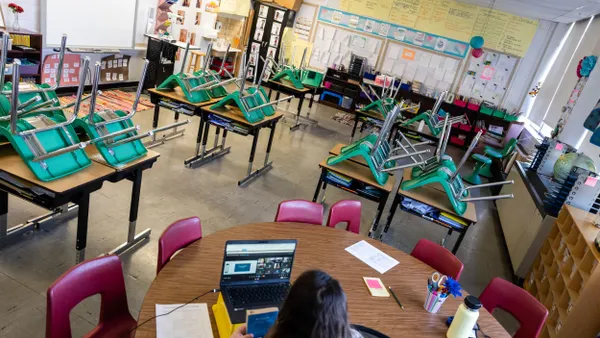Federal funding for education will continue at the fiscal year 2023 level at least through Feb. 2, according to an agreement by Congress. President Joe Biden signed the bill Thursday.
The continuing resolution approved by both the House and Senate this week appears to have avoided a government shutdown at the end of the day Friday, but there's frustration from parents and early childhood education providers that additional money for child care was not made available.
“While we are glad that Congress was able to reach a bipartisan agreement to keep the U.S. government open and temporarily funded, lawmakers neglected to address some key funding shortfalls affecting millions of families with young children," said Kristin Rowe-Finkbeiner, executive director and CEO of MomsRising, in a Nov. 15 statement. MomsRising advocates for affordable, quality child care on behalf of moms, women and families.
COVID-19 emergency funding for child care stabilization grants expired in September. As a result, The Century Foundation has predicted that about 3.2 million children will lose access to child care, and about 70,000 child care programs will close.
Indeed, a survey conducted in October by the National Association for the Education of Young Children and the RAPID survey project at Stanford University's Center on Early Childhood, found that 28% of the 1,067 child care providers who had run out of stabilization funding and who were polled said they had cut wages or were unable to sustain salary increases.
Regarding the entire federal budget, Congress reached a budget deal in June to level-fund nondefense programs, including early childhood and K-12 education, but lawmakers have not been able to agree on specific appropriations.
A Republican-led bill introduced this week before the passage of the continuing resolution recommended a 28% cut, or $22 billion less than current year spending, to the U.S. Department of Education, according to the Committee for Education Funding.
In a Tuesday letter to House lawmakers, AASA, The School Superintendents Association, the Association of School Business Officials and other professional organizations called that proposal "draconian."
"The cuts come at a time when students are struggling to recover from the COVID pandemic and will leave a wake of damage in their path, harming students, educators, families, and the country as a whole," the letter said.
Fiscal year 2024 began Oct. 1, and this is the second continuing resolution passed by Congress.
Meanwhile, lawmakers in at least two states this year debated the implications of rejecting federal education funding. A proposal in the Oklahoma State Legislature recommended a 10-year plan to phase out federal pre-K-12 funding in the state, but the bill was not acted on during the regular session.
Tennessee lawmakers have created a task force to study the impacts of the state rejecting federal education funding. An Oct. 26 report by The Sycamore Institute, a nonpartisan policy research center in Tennessee, said that the state receives $1.1 billion annually in federal K-12 funding, and that even if it rejected those funds, many federal requirements could still apply.
The report also said Tennessee likely has room in its budget to replace federal education dollars at the expense of other investments.
No state has ever rejected annual federal education appropriations, the report said.







 Dive Awards
Dive Awards







